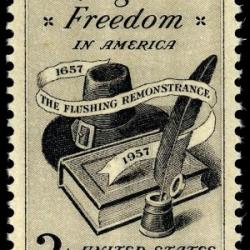While still not a mainstream ideology, dominion theology did claim one notable convert back in the 1980s. Pat Robertson, founder of the Christian Coalition, host of The 700 Club, and sometime Republican candidate for president, embraced the term for many years, becoming among the first of many influential Pentecostal leaders to begin adapting the theonomists’ dominion theology to fit into their non-Calvinist, charismatic form of spirituality.
Robertson eventually backed away from using the language of “dominion” to describe his own theology, I suspect because it threatened his market share among the large premillennial dispensationalist segment of the subculture. Robertson is not a “Rapture” enthusiast, but there are millions of them out there and he wants to keep depositing their checks.
Where Robertson has retreated, other Pentecostal leaders have advanced — most notably C. Peter Wagner’s New Apostolic Reformation, which combines dominion theology with a sort of Amway ecclesiology of multilevel marketing.
As this Pentecostal branch has risen in prominence, the original theonomist/reconstructionist, hyper-Calvinist branch of dominionism has waned a bit. Rushdoony, their guru, and Chilton, their attack-dog, are both dead. Prolific author Gary North is still trying to recover from going all in on predictions of global calamity and his head-for-the-hills survivalism a decade ago due to the Y2K bug. Other theonomists, such as Gary DeMar, remain particularly influential in shaping the legal arguments of far-right Christians at places like Liberty University School of Law, which last year sponsored his explicitly reconstructionist “2010 Sovereignty and Dominion conference — Biblical Blueprints for Victory!” (The exclamation point there is original — part of the name of the event.)
Mainly, though, those calling themselves “theonomists” have receded further from the spotlight because they’ve passed the baton. Marvin Olasky’s World magazine has taken over the thriving niche of southern-gothic Presbyterian dominionism. And Wagner’s NAR is spreading like wildfire — or like Nutrilite — in Pentecostal circles. The NAR’s message travels lighter and faster, unburdened by the baggage of R.J. Rushdoony’s weird butcherings of Kuyper, Van Til and Calvin.
With the new enthusiasm of its Pentecostal branch, dominion theology is also going international.
Rushdoony was always fairly clear-eyed about the near-term prospects for the complete “reconstruction” of America. He imagined it would take generations, maybe centuries, for his kind of Christians to take full control and establish his kind of Christian reign. But Rushdoony’s disciples see the potential for faster success in places like Uganda, where they’ve been pushing for legislation that would, as in their selective reading of the law of Moses, mandate the death penalty for homosexuals.
All of those columns and editorials pooh-poohing the influence of dominion theology were written by people who share one all-important unifying trait. Larry Ross, Doug Groothuis, Joe Carter, Ralph Reed, Ross Douthat, Lisa Miller and all the others who got the memo and wrote the assigned column all have one thing in common: None of them is a gay man living in Uganda.
Or a lesbian woman living in Uganda.
Or a straight man living in Uganda who might be perceived by others as insufficiently masculine or who might be accused by others of being overly masculine and who, thus, may wind up subject to the same oppression, intimidation and lethal injustice that the supposedly non-influential dominionists are gleefully inflicting on every GLBT person in that country.
Any gay man in Uganda could tell you that those dutifully written articles about the “paranoia” or “myths” of dominionist influence are ridiculously, disgracefully out of step with the reality of his daily life. Or at least he could tell you that if he were able to speak up without having to fear that it would cost him his life.
Oh, and there’s also this: If Jesus was telling us the truth in Matthew 25, as I believe he was, then that gay man living in Uganda? That’s Jesus. That lesbian woman or transgendered person or bisexual living in Uganda? Also Jesus.
So, you know, it might be best to put down the nails.












